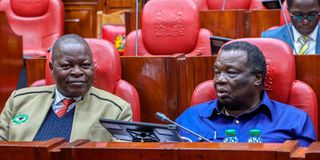Cotu boss Atwoli: Govt officials own power plants, fleecing Kenyans through high power costs

Kuppet Secretary-General Akello Misori (left) and his Cotu counterpart Francis Atwoli before the Energy committee at County Hall in Nairobi on Thursday July 21.
Workers unions have urged MPs to cancel all existing power purchase agreements (PPAs) between Kenya Power and independent power producers (IPPs) to cushion consumers from high electricity bills.
The unions—Central Organization of Trade Unions (Cotu), Kenya Union of Post-Primary Education Teachers (Kuppet), Union of Kenya Civil Servants (UKCS)— and Law Society of Kenya and the Kenya Medical Association (KMA) told a parliamentary committee the cancellation of the “skewed” PPAs will allow for renegotiation at favourable terms.
They also told the committee to enact laws that will force IPPs to be paid in local currencies and have the agreements made public before signing.
Cotu Secretary-General Francis Atwoli claimed senior government officials who own power plants are fleecing Kenyans through the high power costs and MPs should crack the whip. He claimed to know government officials who own IPPs, supply nothing but get paid billions of taxpayers money.
“We can’t have some few people just sitting somewhere and deciding the prices they will sell to Kenyans. These are money makers, they sell nothing but get billions,” Mr Atwoli said.
Gem MP Elisha Odhiambo said it’s sad that most IPPs are owned by Kenyans yet they are subjecting common citizens to high electricity bills. “Those who are stealing from Kenyans through IPPs are fellow Kenyans, this is not just right. You cannot eat your own children,” Mr Odhiambo said.
Mr Atwoli proposed that workers should have a representative on the board of the Energy and Petroleum Regulatory Authority (Epra) to represent consumers interests when energy prices are reviewed.
“Having a representative from Cotu on the Epra board will ensure that the concerns of workers are considered in regulatory decisions that affect energy pricing. Given the significant impact of electricity prices on workers and their households, workers must be represented on the Epra board,” Mr Atwoli said.
Kuppet Secretary-General Akelo Misori told MPs that the high energy cost has drained the already meagre incomes of most workers.
“The rising cost of fuel is a major livelihood issue for workers in Kenya. Petroleum and electricity prices directly determine the cost of living since energy is a key component of the consumer cost of goods and services,” Mr Misori said.
“Some households have seen their energy bills double due to increases in electricity and gas costs. This leads to stress, frustration and decreased motivation at work. Ultimately, it may affect their job performance, productivity and overall engagement in the workplace,” Mr Misori said.
UKCS called for concessions between the government and the IPPs to lower the cost of electricity.
“It is time that IPPs engage in discussions to make concessions to reduce the cost of power, given that most of the measures to reduce electricity are undertaken by Kenya Power,” union Secretary-General Tom Odege said.
The union also called for transparency in all agreements Kenya Power entered in with IPPs to allow for scrutiny by all stakeholders to ensure that they are aligned with the country’s energy objectives. It also called for an audit of the utility’s operations, including procurement procedures and operational efficiency.
“The findings of the audit should guide necessary reforms and actions to improve the company’s financial health and reduce the cost of electricity for consumers,” Mr Odege said.
KMA warned that hospitals are likely to increase their fees in order to meet the increased cost of electricity.
‘The high cost of electricity has increased the operational expenses of hospitals, which require electricity to power medical equipment. This strains hospital budgets and may impact their ability to provide services to Kenyans,” said KMA Chief Executive Officer Brenda Obondo.
The association asked the government to provide subsidies for medical facilities to reduce their electricity costs. It also called for increased investment in renewable energy sources such as solar, wind and geothermal.





